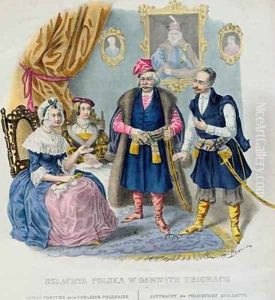Jan Lewicki Paintings
Jan Lewicki was a Polish artist, engraver, and printer, recognized for his significant contributions to Polish art in the 19th century. Born on November 17, 1795, in Warsaw, Poland, Lewicki was active during a period of intense political upheaval and national uprisings. Despite the challenging circumstances of his time, he managed to produce works that have left a lasting impression on the cultural heritage of Poland.
Lewicki began his artistic education at the Warsaw Lyceum and continued his studies at the Warsaw University of Technology. His talents were apparent early on, and he became particularly skilled in the art of engraving. With a keen eye for detail and a deft hand, Lewicki's engravings ranged from depictions of historical events to portraits and landscapes. His work not only reflected the artistic styles of the period but also became an important visual documentation of Polish life and history.
Throughout his career, Jan Lewicki worked with various printing techniques, including lithography, which was a relatively new printmaking process at the time. He played a crucial role in developing and popularizing lithography in Poland, thus contributing to the broader European lithographic tradition. His dedication to his craft and his willingness to experiment with new techniques allowed him to excel and to train a new generation of Polish artists and engravers.
Lewicki's work often carried patriotic overtones, which resonated with the Polish populace during the nation's struggles for independence. Despite the challenges posed by political censorship and restrictions, he managed to produce art that spoke to the national spirit and cultural identity of the Polish people.
Jan Lewicki passed away on September 23, 1871, in Warsaw. His legacy endures through his numerous engravings and prints, which remain important artifacts of Polish cultural history. His contributions to the development of printmaking and engraving in Poland have made him an enduring figure in the annals of Polish art history.
